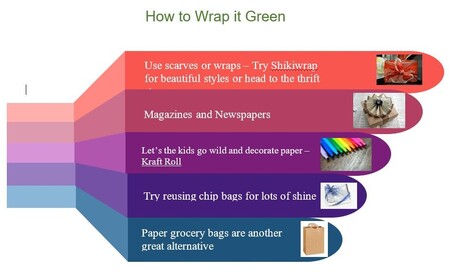
Sustainable Celebrations: A Guide to an Eco-Friendly Holiday
With the holiday's right around the corner, it is a busy time of the year as well as a wasteful one. It is estimated that in the US, 2.3 million pounds of wrapping paper each year ends up in landfills. Did you know that many types of wrapping paper can't be recycled? Many of us love all the metallic foil or and glittery paper for the holidays. Unfortunately, this paper cannot be recycled, along with any paper lined with plastic, tissue paper, or any wrapping paper bearing bows, ribbons. When these non-recyclable items are sent to recycling facilities, they can become tangled in equipment (ribbons) or contaminate bales of higher quality paper (tissue paper, glitter, foil paper). A lower impact option is to go for sturdy/high quality gift bags instead of wrapping paper and then use the same bags over and over for several years. If you're crafty, there are also numerous alternatives to traditional gift wrap that may speak to your artistic side.
What about the Christmas tree? Should you buy a real one or an artificial one? Artificial trees are often seen as a more sustainable option because they can be reused for many years. However, it is important to note that the production of artificial trees contributes to carbon emissions. According to Carbon Trust, the production of a single artificial tree can result in up to 88 pounds of carbon dioxide emissions, which is equivalent to roughly 5 gallons of gas. On the other hand, real Christmas trees have a lower carbon footprint at only 7.7 pounds of CO2 throughout its lifespan. Additionally, while growing, these trees help sequester carbon and produce oxygen, contributing to a healthier environment. Furthermore, opting for a real tree supports the forestry industry and the maintenance of tree farms. In the US, an estimated 350-500 million Christmas trees are growing, with only about 30 million being cut each year for Christmas. This means that a significant number of trees continue to grow and contribute to carbon sequestration and oxygen production.
Christmas tree? Should you buy a real one or an artificial one? Artificial trees are often seen as a more sustainable option because they can be reused for many years. However, it is important to note that the production of artificial trees contributes to carbon emissions. According to Carbon Trust, the production of a single artificial tree can result in up to 88 pounds of carbon dioxide emissions, which is equivalent to roughly 5 gallons of gas. On the other hand, real Christmas trees have a lower carbon footprint at only 7.7 pounds of CO2 throughout its lifespan. Additionally, while growing, these trees help sequester carbon and produce oxygen, contributing to a healthier environment. Furthermore, opting for a real tree supports the forestry industry and the maintenance of tree farms. In the US, an estimated 350-500 million Christmas trees are growing, with only about 30 million being cut each year for Christmas. This means that a significant number of trees continue to grow and contribute to carbon sequestration and oxygen production.
How you dispose of your tree matters! Just like certain wrapping papers, artificial trees cannot be recycled but real ones can be composted. If you are looking for an environmentally friendly way to dispose of your Christmas tree, Kane County's Recycling site has all your options, including starting a brush pile for backyard habitat, dropping off, or putting the tree out curbside for pickup by your waste hauler.
Ultimately, the choice between a real or artificial Christmas tree depends on personal preferences and values. If sustainability is a priority, a real tree may be the better option, provided it is sourced responsibly and disposed of properly after use. If reusability and convenience are important, an artificial tree may be more suitable, try some of these fun DIY option using sustainable or recycled materials.

